Low-Carbon Policies and Power Generation Modes: An Evolutionary Game Analysis of Vertical Governments and Power Generation Groups
Abstract
1. Introduction
2. Methodology
2.1. Problem Statement and Model Variables
2.2. Model Assumptions
- (1)
- The game players: This paper considers the tripartite evolutionary game model, where all the players possess bounded rationality. Over time, their strategic choices evolve and stabilize toward the optimal strategies. Among them, the CG is Game Player 1, the LGs are Game Player 2, and the PGGs are Game Player 3.
- (2)
- The strategies of game players: The CG designs and supervises low-carbon policies, with a strategy set of (supervision, no supervision). The probabilities of choosing the “supervision” and “no supervision” strategies are and , respectively. LGs enforce low-carbon policies and accept supervision from the CG, with a strategy set of (enforcement, no enforcement). The probabilities of choosing the “enforcement” and “no enforcement” strategies are and , respectively. PGGs decide the power generation mode and accept supervision from the CG, with a strategy set of (low-carbonization, no low-carbonization). The probabilities of choosing the “low-carbonization” and “no low-carbonization” strategies are and , respectively.
- (3)
- The payoffs of game players: The CG has a long-term vision and takes the externalities of different power generation modes for the environment and energy security into consideration. LGs have a short-term vision and do not consider these externalities.
2.3. Model Construction
3. Results and Discussion
3.1. Strategic Stability Analysis of the Three Players
3.1.1. Strategic Stability Analysis of the CG
3.1.2. Strategic Stability Analysis of LGs
3.1.3. Strategic Stability Analysis of PGGs
3.2. Stability Analysis of the Equilibrium Points in the Game
3.3. Numerical Simulation
3.3.1. Parameter Settings
3.3.2. Results
- (1)
- Impacts of changes in each player’s initial strategy on the evolution of the system.
- (2)
- Impacts of changes in the CG’s supervision costs on the evolution of the system.
- (3)
- Impacts of changes in LGs’ enforcement costs on the evolution of the system.
- (4)
- Impacts of changes in PGGs’ low-carbonization costs on the evolution of the system.
- (5)
- Impacts of changes in the penalties on the evolution of the system.
- (6)
- Impacts of changes in the extra taxes on the evolution of the system.
- (7)
- Impacts of changes in the energy security externalities and environmental externalities on the evolution of the system.
4. Conclusions
- (1)
- For the CG, the reduction in supervision costs or the increase in penalty incomes that could be obtained from choosing the “supervision” strategy motivated it to supervise LGs’ and PGGs’ behaviors, while parameters related to energy security externalities or environment externalities had no impact on its decision making.
- (2)
- For the LGs, a rise in the probability of the CG initially supervising LGs’ and PGGs’ behaviors, a decrease in the enforcement costs, or an increase in the penalty expenses motivated them to enforce low-carbon policies.
- (3)
- For the PGGs, a reduction in low-carbonization costs or an increase in extra tax expenses motivated them to choose the “low-carbonization” strategy.
- (4)
- When the supervision costs of the CG were less than the penalty incomes it could receive from choosing the “supervision” strategy, the enforcement costs of the LGs exceeded the unilateral penalty expenses, and the low-carbonization costs of the PGGs were less than the sum of the bilateral penalty expenses and extra tax expenses, the CG chose a “supervision” strategy, the LGs chose a “no enforcement” strategy, and the PGGs chose a “low-carbonization” strategy.
- (1)
- The CG should reduce supervision costs. For example, in order to simplify the supervision process, a CG could establish a real-time public database for LGs’ low-carbon policy enforcement and PGGs’ CO2 emissions and build an effective evaluation system to help evaluate their behaviors. When it comes to LGs, a CG could analyze the low-carbon policy enforcement news on the LGs’ official websites by using artificial intelligence tools and upload the analysis results to the database. When it comes to PGGs, a CG could build some CO2 emission monitoring points around PGGs and upload real-time CO2 emission data to the database.
- (2)
- The CG should increase the level of penalties, which will increase the costs of LGs choosing the “no enforcement” strategies and PGGs choosing the “no low-carbonization” strategies, thereby reducing the occurrence of environmentally unfriendly strategies.
- (3)
- LGs should decrease enforcement costs. For instance, LGs could enhance promotion of the importance of low-carbon production and life, leverage the collaborative effectiveness of multiple stakeholders, and encourage consumers to force PGGs to engage in a low-carbon power generation mode.
- (4)
- LGs should raise the carbon tax level within a reasonable range. An increase in the carbon tax will reduce the CO2 emissions of PGGs, but it may also affect the profits of PGGs [11], and a trade-off should be made.
- (5)
- PGGs should reduce low-carbonization costs. At present, PGGs could use mature low-carbon power generation technologies, such as increasing the installed capacity of wind and solar power on a large scale and implementing clean transformation of thermal power. In the future, PGGs could allocate research and development investments for new technologies reasonably, avoiding investing heavily in low returns and high-cost technologies.
- (1)
- We only considered the strategies of a CG, LGs, and PGGs and failed to take the strategies of consumers into consideration.
- (2)
- For simplification of the analysis, we assumed that the “no supervision” costs of the CG, the “no enforcement” costs of the LGs, and the “no low-carbonization” costs of the PGGs were all zero, which is not realistic.
- (1)
- We will take the consumers into consideration and study the interactions among the CG, LGs, PGGs, and consumers through a four-party evolutionary game model in future studies.
- (2)
- In future research, we may try to discard this unrealistic assumption and come up with some new and interesting conclusions.
Author Contributions
Funding
Data Availability Statement
Conflicts of Interest
Appendix A. The Payoffs of Three Players
Appendix A.1. Scenarios Where the CG Chooses the “Supervision” Strategy
Appendix A.2. Scenarios Where the CG Chooses the “No Supervision” Strategy
Appendix B. The Replicator Dynamics Equations of Three Players
Appendix B.1. The Replicator Dynamics Equation of the CG
Appendix B.2. The Replicator Dynamics Equation of LGs
Appendix B.3. The Replicator Dynamics Equation of PGGs
Appendix C. The Jacobian Matrices at Eight Equilibrium Points
References
- IPCC. Summary for policymakers. In Climate Change 2023: Synthesis Report; Lee, H., Romero, J., Eds.; Contribution of Working Groups I, II and III to the Sixth Assessment Report of the Intergovernmental Panel on Climate Change; IPCC: Geneva, Switzerland, 2023; pp. 1–34. [Google Scholar]
- IEA. Global Energy Review 2025; IEA: Paris, France, 2025; p. 31. Available online: https://www.iea.org/reports/global-energy-review-2025 (accessed on 8 June 2025).
- IEA. Electricity 2025; IEA: Paris, France, 2025; p. 10. Available online: https://www.iea.org/reports/electricity-2025 (accessed on 8 June 2025).
- National Energy Administration. Transcript of the National Energy Administration’s q2 2025 Press Conference. Available online: https://www.nea.gov.cn/20250428/8a71d8aad52945788e9ddd217224eeb3/c.html (accessed on 10 June 2025).
- Xinhua. China Maps Path to Carbon Peak, Neutrality Under New Development Philosophy. Available online: https://english.www.gov.cn/policies/latestreleases/202110/24/content_WS61755fe9c6d0df57f98e3bed.html (accessed on 10 June 2025).
- Yang, S.; Yu, J. Low-carbonization game analysis and optimization in a two-echelon supply chain under the carbon-tax policy. J. Chin. Econ. Foreign Trade Stud. 2016, 9, 113–130. [Google Scholar] [CrossRef]
- Li, S.; Qu, S.; Wahab, M.I.M.; Ji, Y. Low-carbon supply chain optimisation with carbon emission reduction level and warranty period: Nash bargaining fairness concern. Int. J. Prod. Res. 2024, 62, 6665–6687. [Google Scholar] [CrossRef]
- Zhang, H.; Li, P.; Zheng, H.; Zhang, Y. Impact of carbon tax on enterprise operation and production strategy for low-carbon products in a co-opetition supply chain. J. Clean. Prod. 2021, 287, 125058. [Google Scholar] [CrossRef]
- Yu, W.; Wang, Y.; Feng, W.; Bao, L.; Han, R. Low carbon strategy analysis with two competing supply chain considering carbon taxation. Comput. Ind. Eng. 2022, 169, 108203. [Google Scholar] [CrossRef]
- Zhong, Y.; Sun, H. Game theoretic analysis of prices and low-carbon strategy considering dual-fairness concerns and different competitive behaviours. Comput. Ind. Eng. 2022, 169, 108195. [Google Scholar] [CrossRef]
- Yu, J.; Yang, S.; Feng, Z. Game analysis between manufacturer and retailer under carbon tax policy. Sustainability 2025, 17, 6183. [Google Scholar] [CrossRef]
- Meng, J.; Long, Y.; Lefeng, S. Stakeholders’ evolutionary relationship analysis of China’s national park ecotourism development. J. Environ. Manag. 2022, 316, 115188. [Google Scholar] [CrossRef]
- Wu, Y.E.; Wang, X.; Liu, Z.; Zhao, X. Research on low-carbon technology diffusion among enterprises in networked evolutionary game. Chaos Solitons Fractals 2023, 174, 113852. [Google Scholar] [CrossRef]
- Yu, T.; Zhu, Y.; Liu, J.; Han, Y.; Li, Y. A new analysis of an application of low-carbon pre-selecting technology (lcpt) for minerals: An evolutionary game model among stakeholders. J. Clean. Prod. 2025, 486, 144590. [Google Scholar] [CrossRef]
- Nie, S.; Cai, G.; Huang, Y.; He, J. Deciphering stakeholder strategies in electric vehicle battery recycling: Insights from a tripartite evolutionary game and system dynamics. J. Clean. Prod. 2024, 452, 142174. [Google Scholar] [CrossRef]
- Jia, X.; Yu, C.; Mou, S. Sustainable livestock and poultry manure management considering carbon trading. Energy 2025, 326, 136267. [Google Scholar] [CrossRef]
- Zhang, Z.; Ling, D.; Yang, Q.; Feng, Y.; Xiu, J. Central environmental protection inspection and carbon emission reduction: A tripartite evolutionary game model from the perspective of carbon neutrality. Pet. Sci. 2024, 21, 2139–2153. [Google Scholar] [CrossRef]
- Sheng, J.; Zhou, W.; Zhu, B. The coordination of stakeholder interests in environmental regulation: Lessons from China’s environmental regulation policies from the perspective of the evolutionary game theory. J. Clean. Prod. 2020, 249, 119385. [Google Scholar] [CrossRef]
- Hu, Z.; Ma, J.; Zhong, Y.; Zhang, J.; Song, Y. Multi-agent behavior strategies of weee recycling considering public participation under environmental regulation: A perspective of dual governance. J. Clean. Prod. 2024, 484, 144327. [Google Scholar] [CrossRef]
- Jiang, K.; Chen, X.; Wang, F. How to escape the dilemma of carbon emission reduction policies implementation under Chinese fiscal decentralization? Technol. Forecast. Soc. Change 2024, 206, 123518. [Google Scholar] [CrossRef]
- Xia, X.; Zeng, X.; Wang, W.; Liu, C.; Li, X. Carbon constraints and carbon emission reduction: An evolutionary game model within the energy-intensive sector. Expert. Syst. Appl. 2024, 244, 122916. [Google Scholar]
- Zhou, W.; Shi, Y.; Zhao, T.; Cao, X.; Li, J. Government regulation, horizontal coopetition, and low-carbon technology innovation: A tripartite evolutionary game analysis of government and homogeneous energy enterprises. Energy Policy 2024, 184, 113844. [Google Scholar]
- Wen, R.; Heng, Z.; Jin, Y. How to break carbon lock-in of thermal power industry in China—A tripartite evolutionary game analysis. Appl. Energy 2025, 377, 124504. [Google Scholar] [CrossRef]
- Sun, G.; Yuan, B.; Zhang, H.; Xia, P.; Wu, C.; Gong, Y. Game-optimization modeling of shadow carbon pricing and low-carbon transition in the power sector. Energies 2025, 18, 4173. [Google Scholar] [CrossRef]
- Unruh, G.C. Understanding carbon lock-in. Energy Policy 2000, 28, 817–830. [Google Scholar] [CrossRef]
- Su, Q.; Zhou, P.; Ding, H.; Xydis, G. Transition towards a hybrid energy system: Combined effects of renewable portfolio standards and carbon emission trading. Energy Econ. 2024, 135, 107638. [Google Scholar] [CrossRef]
- Ou, K.; Shi, Y.; Zhou, W. An evolutionary game study on green technology innovation of coal power firms under the dual-regulatory system. Energies 2024, 17, 607. [Google Scholar] [CrossRef]
- Yu, D.; Zhang, C.; Wang, S.; Zhang, L. Evolutionary game and simulation analysis of power plant and government behavior strategies in the coupled power generation industry of agricultural and forestry biomass and coal. Energies 2023, 16, 1553. [Google Scholar] [CrossRef]
- Huang, T.; Liu, Z.; Zhao, T. Evolutionary game analysis of responding to the EU’S carbon border adjustment mechanism. Energies 2022, 15, 427. [Google Scholar] [CrossRef]
- Jin, Z.; Li, Y.; Gruyer, D.; Tu, M. Enhancing the carbon reduction potential in ridesplitting through evolutionary game strategies of tripartite stakeholders under carbon-inclusive policy. Energies 2024, 17, 4103. [Google Scholar] [CrossRef]
- Selten, R. A note on evolutionarily stable strategies in asymmetric animal conflicts. J. Theor. Biol. 1980, 84, 93–101. [Google Scholar] [CrossRef]
- Ritzberger, K.; Weibull, J.W. Evolutionary selection in normal-form games. Econometrica 1995, 63, 1371–1399. [Google Scholar] [CrossRef]
- Wainwright, J. A dynamical systems approach to bianchi cosmologies: Orthogonal models of class A. Class. Quantum Gravity 1989, 6, 1409. [Google Scholar] [CrossRef]
- Friedman, D. Evolutionary games in economics. Econometrica 1991, 59, 637–666. [Google Scholar] [CrossRef]
- Lyapunov, A.M. The general problem of the stability of motion. Int. J. Control 1992, 55, 531–534. [Google Scholar] [CrossRef]




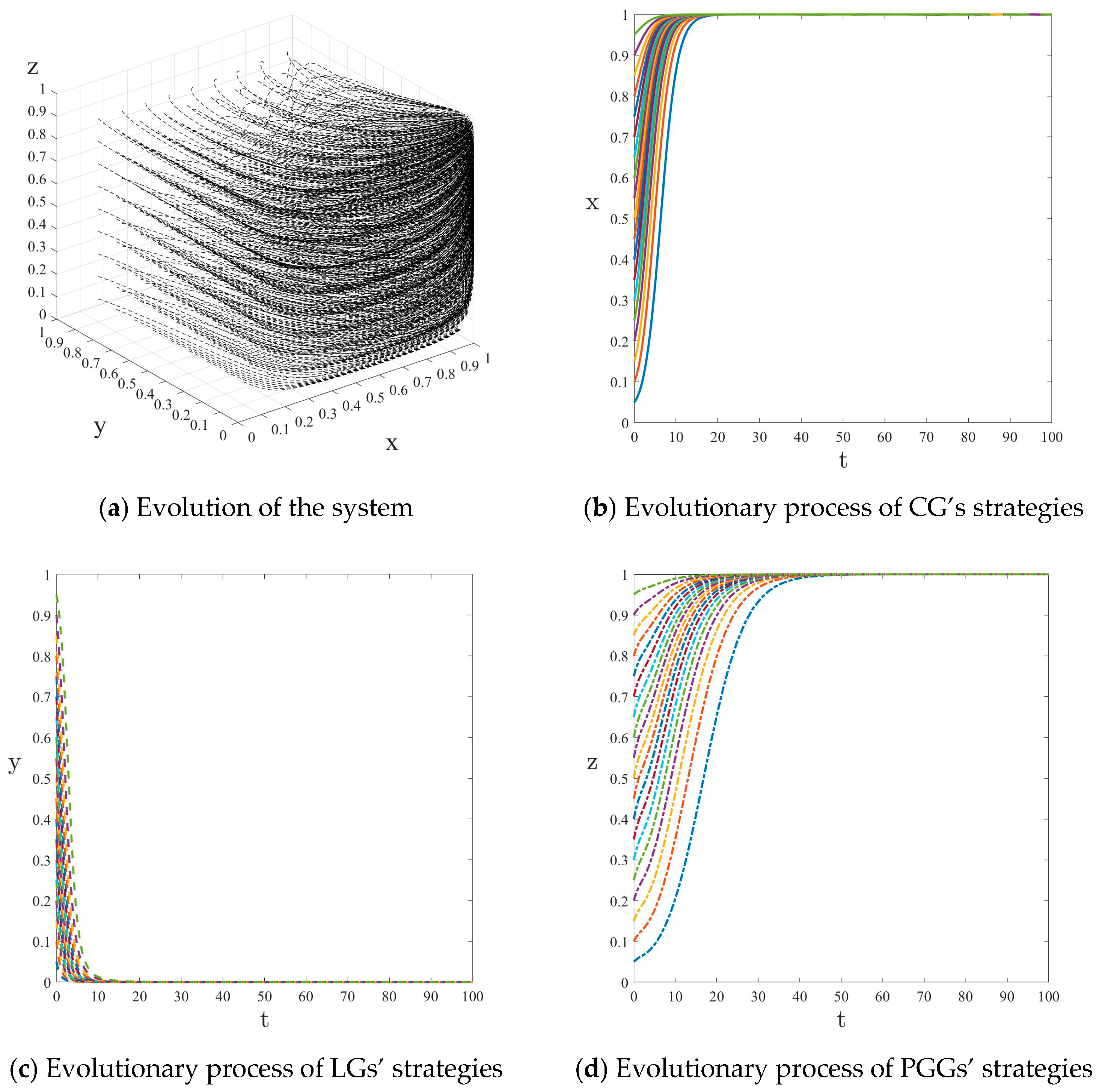

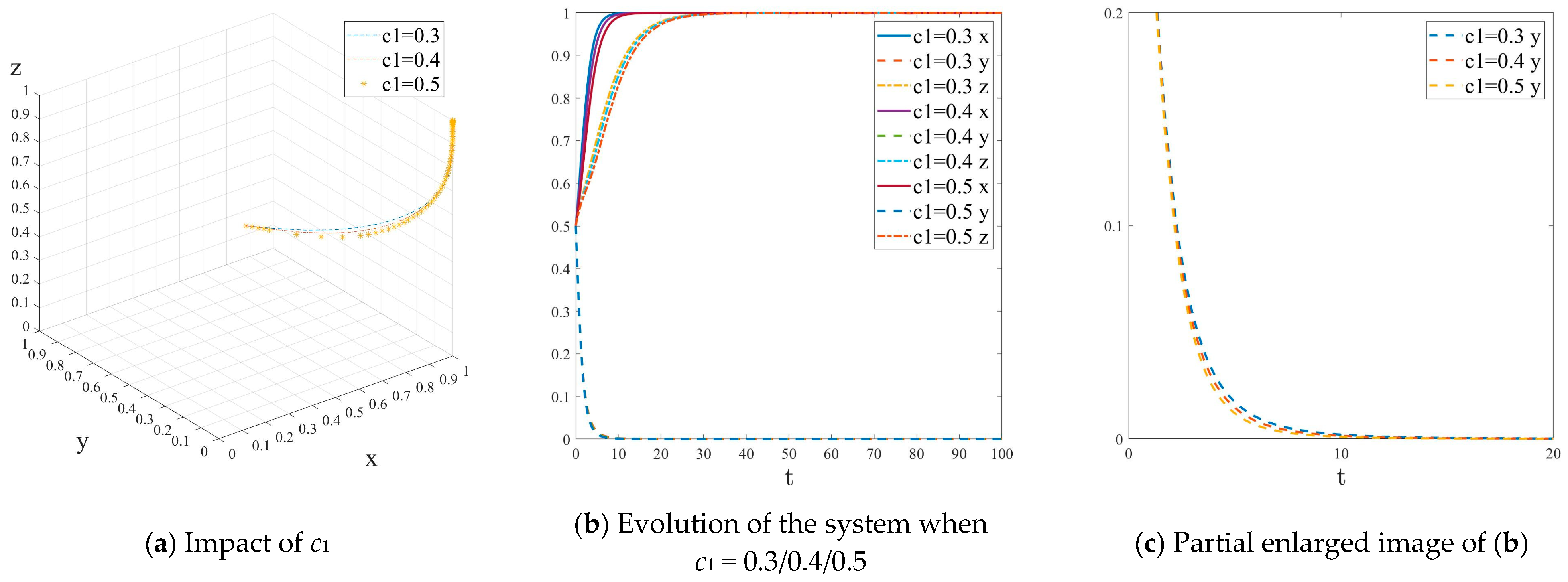
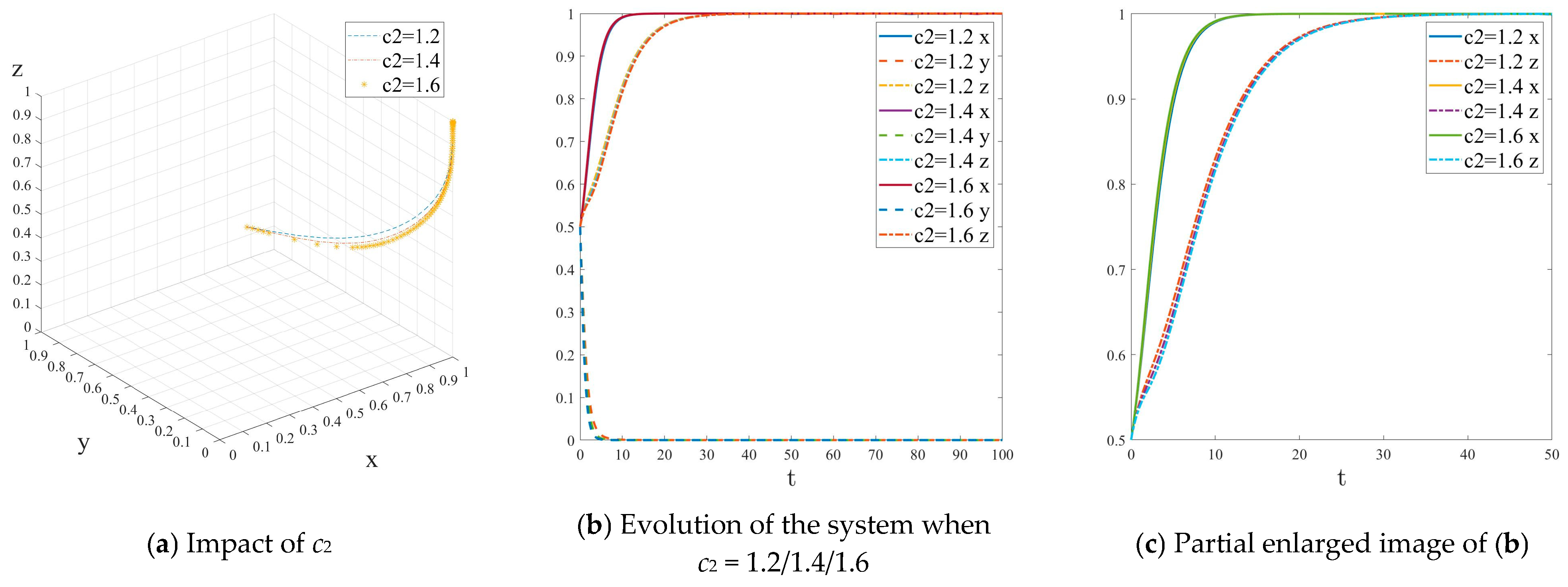
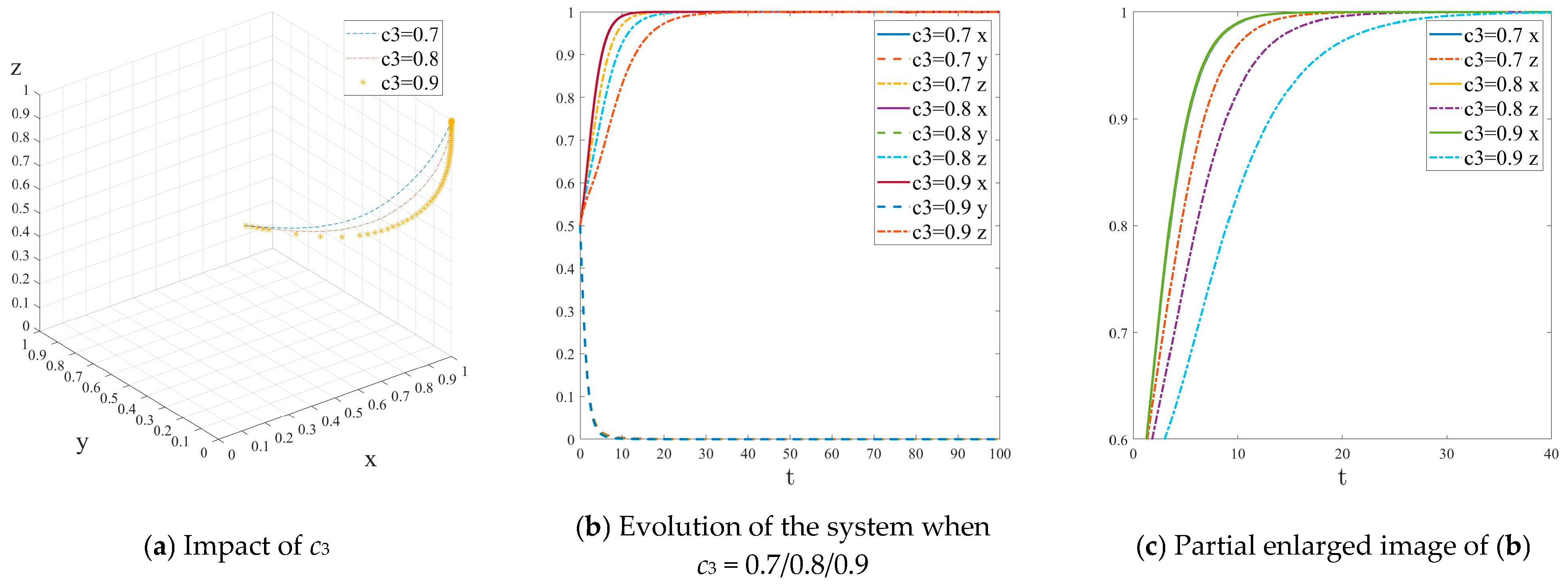
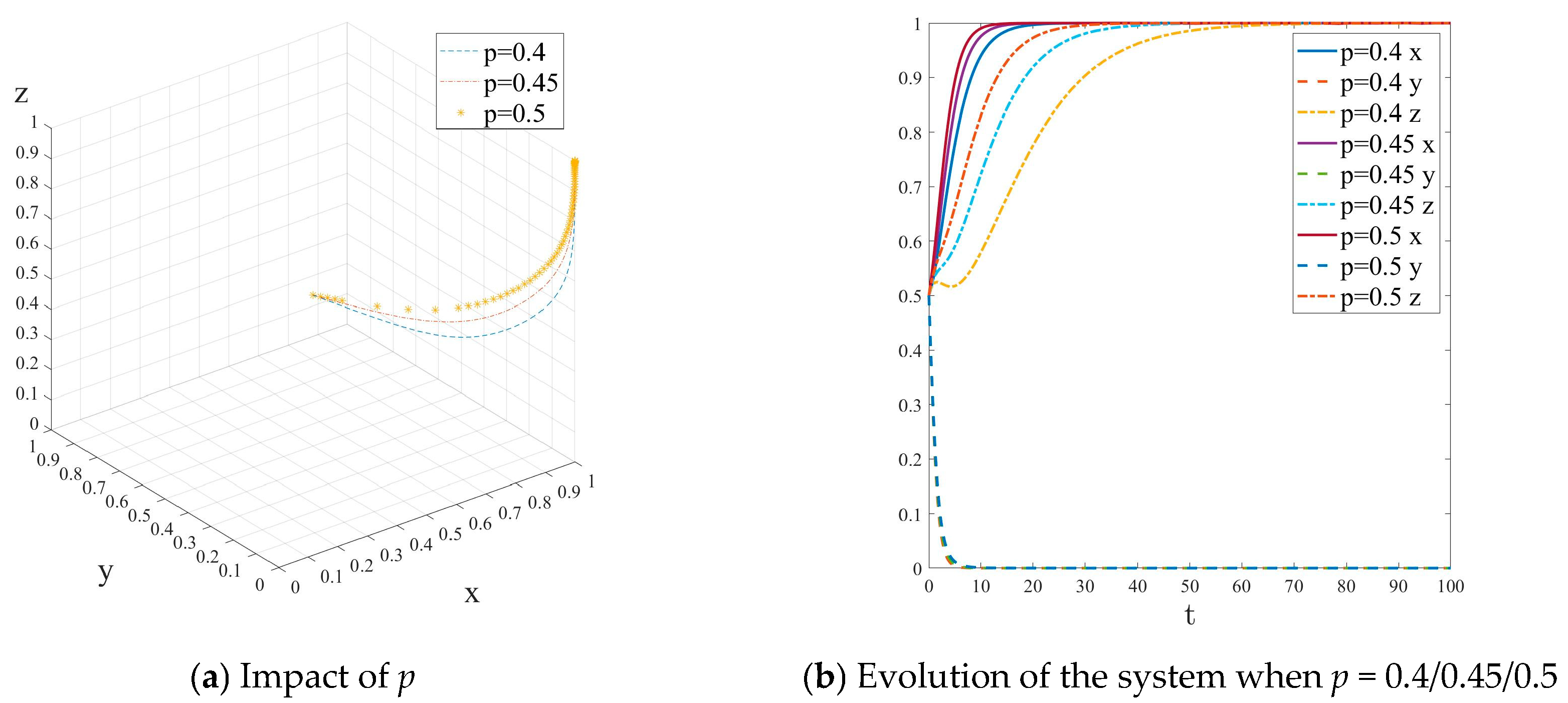
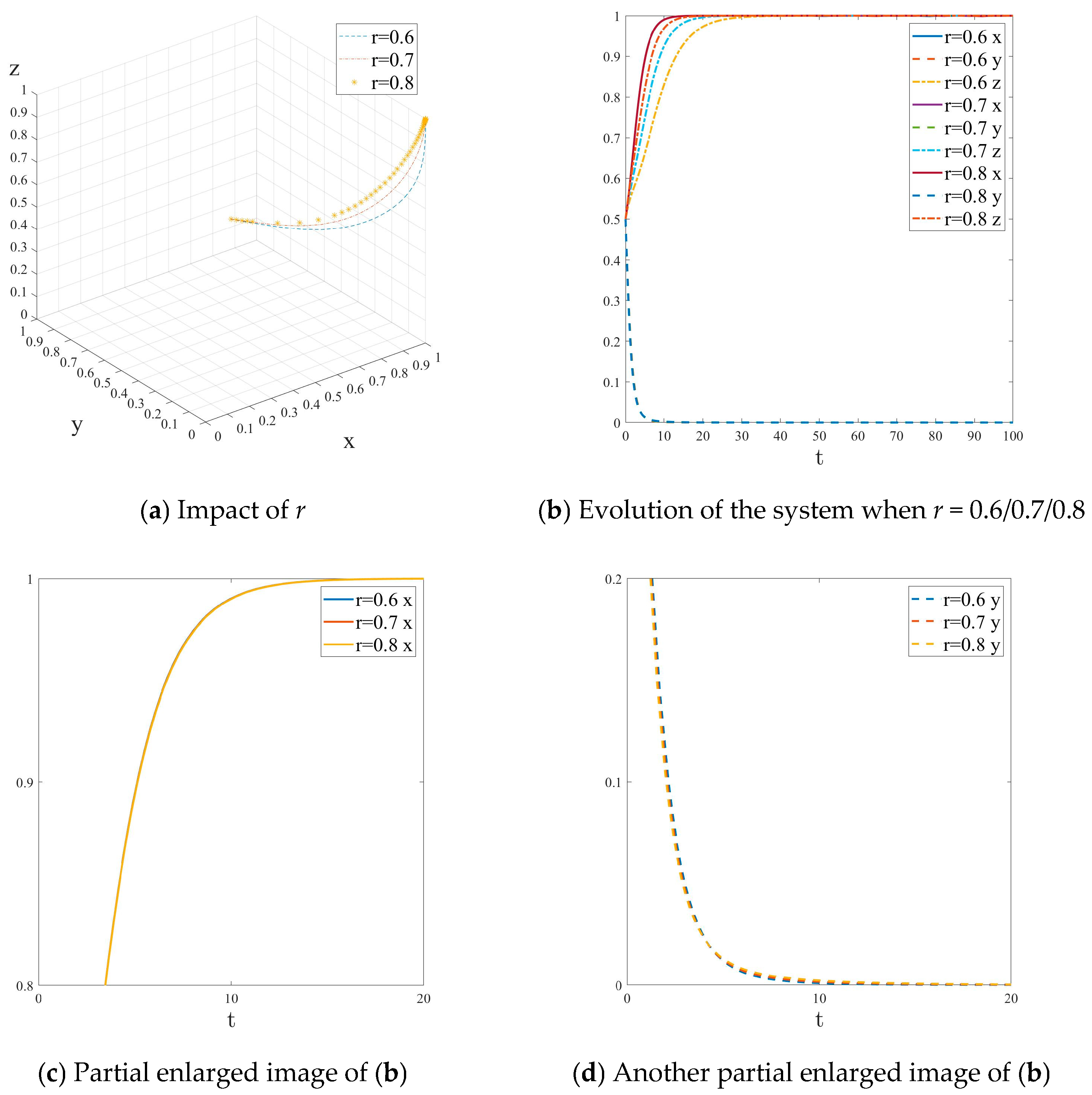
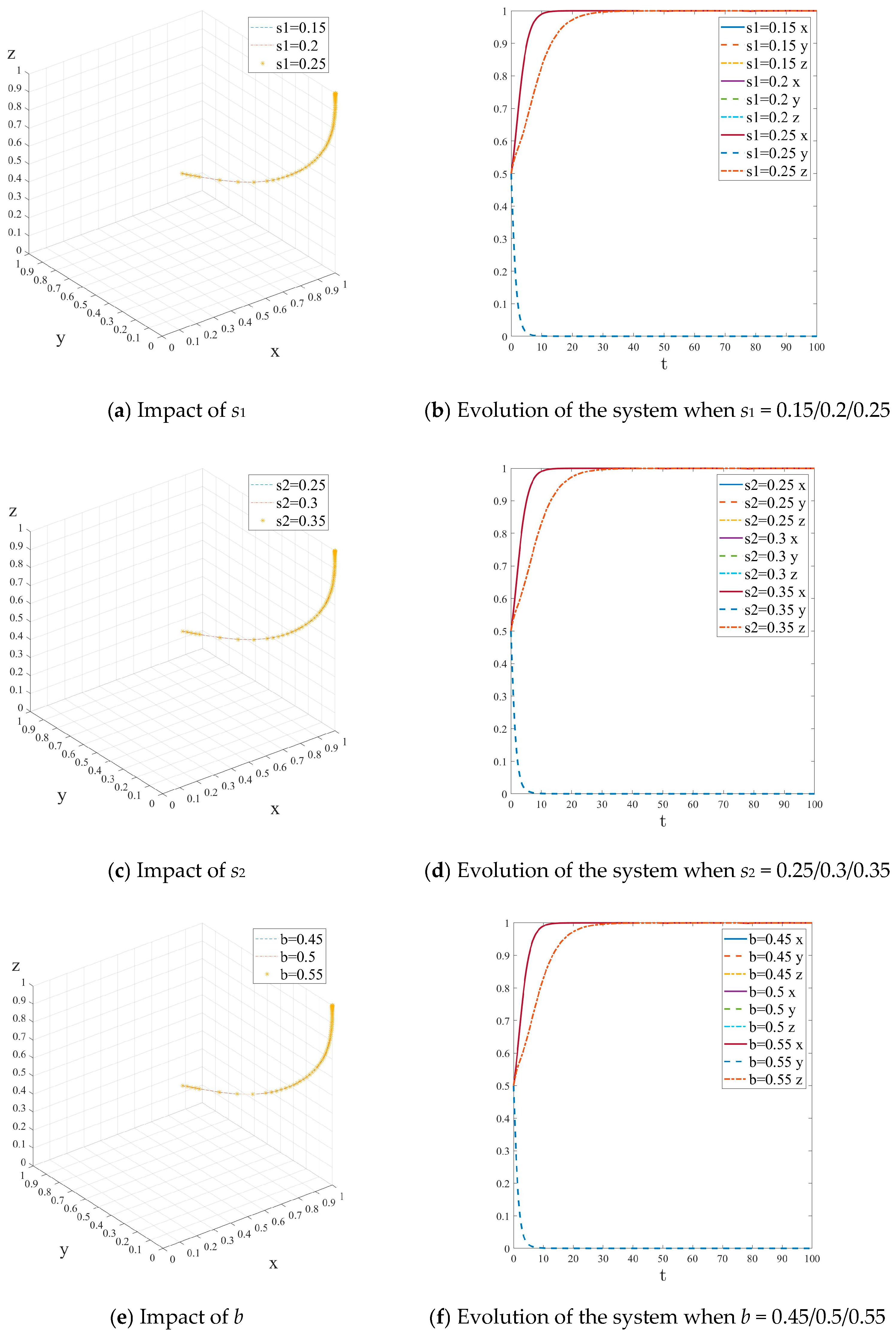
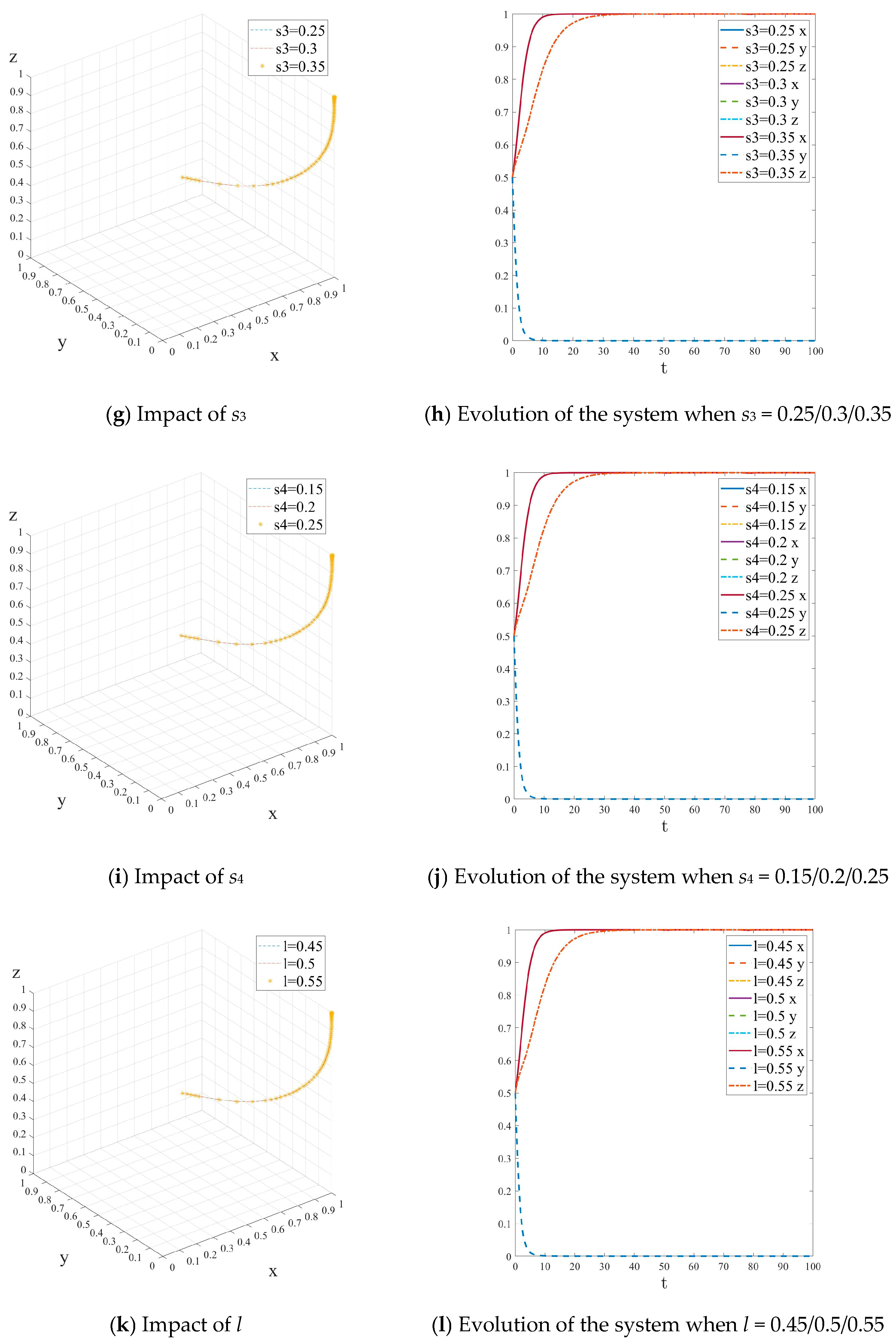
| Parameter | Meaning | Note |
|---|---|---|
| Supervision costs of CG | ||
| Enforcement costs of LGs | ||
| Low-carbonization costs of PGGs | ||
| “No enforcement” or “no low-carbonization” penalties | ||
| Extra tax revenues or expenses of LGs or PGGs when PGGs carry out non-low-carbon power generation mode | ||
| Negative externalities of low-carbon power generation mode on fossil energy security | ||
| Positive externalities of low-carbon power generation mode on non-fossil energy security | ||
| Negative externalities of non-low-carbon power generation mode on non-fossil energy security | ||
| Positive externalities of non-low-carbon power generation mode on fossil energy security | ||
| Positive externalities of low-carbon power generation mode on environment | ||
| Negative externalities of non-low-carbon power generation mode on environment |
| LGs | PGGs | |||
|---|---|---|---|---|
| Low-Carbonization | No Low-Carbonization | |||
| CG | Supervision | Enforcement | ||
| No enforcement | ||||
| No supervision | Enforcement | |||
| No enforcement | ||||
| Equilibrium Point | Eigenvalues of the Jacobian Matrices | Conclusion | Condition | Scenario | |
|---|---|---|---|---|---|
| Symbols | |||||
| ESS | ① | Scenario 1 | |||
| ESS | ② | Scenario 2 | |||
| Unstable point | |||||
| ESS | ③ | Scenario 3 | |||
| Unstable point | |||||
| ESS | ④ | Scenario 4 | |||
| Unstable point | |||||
| Unstable point | |||||
Disclaimer/Publisher’s Note: The statements, opinions and data contained in all publications are solely those of the individual author(s) and contributor(s) and not of MDPI and/or the editor(s). MDPI and/or the editor(s) disclaim responsibility for any injury to people or property resulting from any ideas, methods, instructions or products referred to in the content. |
© 2025 by the authors. Licensee MDPI, Basel, Switzerland. This article is an open access article distributed under the terms and conditions of the Creative Commons Attribution (CC BY) license (https://creativecommons.org/licenses/by/4.0/).
Share and Cite
Yu, J.; Feng, Z. Low-Carbon Policies and Power Generation Modes: An Evolutionary Game Analysis of Vertical Governments and Power Generation Groups. Energies 2025, 18, 5210. https://doi.org/10.3390/en18195210
Yu J, Feng Z. Low-Carbon Policies and Power Generation Modes: An Evolutionary Game Analysis of Vertical Governments and Power Generation Groups. Energies. 2025; 18(19):5210. https://doi.org/10.3390/en18195210
Chicago/Turabian StyleYu, Jun, and Zongxian Feng. 2025. "Low-Carbon Policies and Power Generation Modes: An Evolutionary Game Analysis of Vertical Governments and Power Generation Groups" Energies 18, no. 19: 5210. https://doi.org/10.3390/en18195210
APA StyleYu, J., & Feng, Z. (2025). Low-Carbon Policies and Power Generation Modes: An Evolutionary Game Analysis of Vertical Governments and Power Generation Groups. Energies, 18(19), 5210. https://doi.org/10.3390/en18195210





